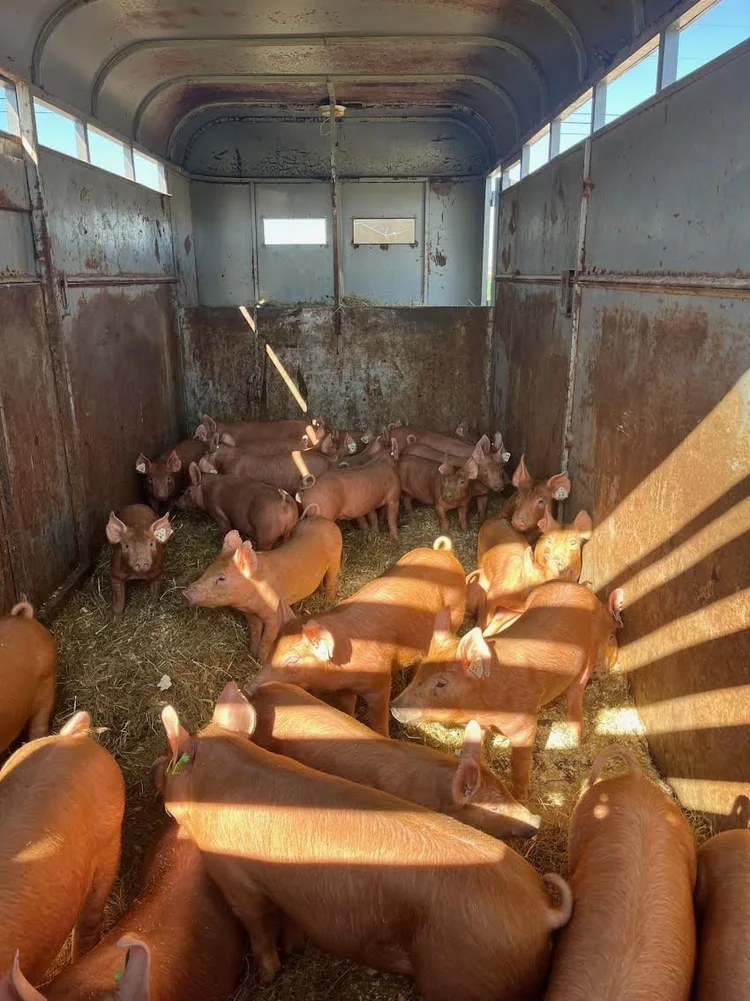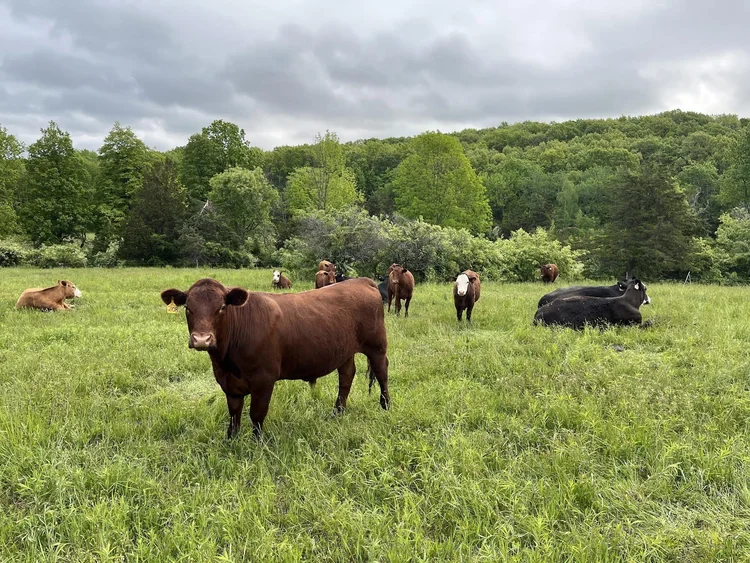Your basket is empty
Already have an account? Log in to check out faster.
Already have an account? Log in to check out faster.

We’ve had quite the eventful past two weeks, both on and off the farm. We hit the road for four days to pick up some of the best organic pigs money can buy in Albion, Maine from our new friends of Misty Brook Farm. These Tamworth pigs have been bred on pasture at Misty Brook for many generations and are now a large and vibrant drove who have been adjusting very well the their new home here at Northaven.
After eight hours driving with a trailer, a nine-month-old and a nursing mother in tow, it does beg the question; why go to Maine for piglets? After all, there are plenty of pigs in New York. Why go to such great lengths to get these pigs?

Well, the main reason is, Misty Brook doesn’t take organic farming lightly. They have been diligently breeding for qualities we want out of our pastured pigs such as hardiness, ability to forage a high volume of their nutrition, and ability to gain weight at a rate that is advantageous for us. Not only will these pigs make up the pork chops that will be feeding many of you this winter, but five of these beautiful animals will be the foundation of our heritage Tamworth breeding stock program. (so we can eventually stop purchasing piglets).
It’s common for many organic livestock businesses to have conventionally raised breeding stock, whose progeny they can then certify as organic. These mothers are receiving routine antibiotics, dewormers and insecticides while the piglets are not. Why do this? Because it’s easy, especially at the large scale most of the organic pork in our country is produced at. This is also the case for most organic grass-fed beef operations— conventional cow/calf herds whose calves they can then certify. Think New Zealand sourced beef, such as that of many of our “ethical” food aggregators such as Butcher Box.
To the modern mind, why would this really matter? After all, as long as the pig you’re eating wasn’t exposed to these toxins, shouldn’t it be as clean of a product as any? To that we answer: No. The research of Micheal Skinner at Washington State University on rats reflects this. He exposed one generation of pregnant mothers to a common agricultural fungicide, Vinclozolin. This chemical is a proven endocrine disruptor which affects pregnancy outcomes and sperm counts across mammalian species as well as increases likelihood to contract all diseases including cancer. It is still used in conventional farming in our country today. But perhaps his most interesting finding was that the fourth generation of progeny of the original mothers who were exposed to Vinclozolin (the generations following the first had not been exposed at all) were actually worse in all health outcomes than the generation that was exposed. This finding was repeatable and replicable. He also found that rats exposed to DDT had great-grandchildren far more likely to be obese despite eating the same diet and calories as their healthy predecessors.
Going back to our pigs, I believe this illustrates a case as to why sourcing animals who have been organic for over ten generations is the only way to produce food that is truly free from disease and contamination; so to Maine we went!
As a new farm, there is a lot we don’t have yet. The piece of equipment I felt missing the most over these past two weeks was a livestock trailer. However, while navigating the challenge of migrating around the the Northeast picking up some of the best animals one can get, I experienced the amazing support system of other local farmers who let us borrow their trailers to get the animals we needed. It was such a reminder as to what we are a part of here in the small food movement of the Hudson Valley.

Many people, when other small local farms are brought up in conversation with me, say things like, “Oh, the competition…”. The reality couldn’t be further from the truth. Truth is, only about 1-2% of people in NY source their food from local farms. As small producers, we are not trying to fight over this small piece of pie, but rather try to make the pie bigger. Our competition is not Chaseholm Farm, who let us borrow their trailer to pick up some cows, or Harrier Fields Farm, who loaned us their trailer for our trip to Maine. Rather, the competition is Walden “Local” Meat, Butcher box, and organic meat sold in stores that’s mostly imported from far away lands whose farming practices really cannot be regulated. All this to say, we are grateful to those farms who continue to support us. Although we have nuances and distinctions that make us different from one another, we are all on the same team in this pursuit.
We’ve had an influx of 17 more cattle over the last two weeks, including five organic mommas who are due in September. These gals came from Grimaldi’s Organic Farm in Ghent. We also received 12 feeder cows who will be ready for

“freezer camp” throughout the next 18 months, from Grassroots Farm in Stone Ridge.
Although I am a firm believer in purebred livestock with close genetic lines, as we accumulate livestock for our farm, we are taking the best animals from different farms that we can get our hands on. Our purebred Devons from Harrier Fields Farm will arrive in the next few weeks, and building a herd on these very unique and expensive animals will take some time. In the meantime, we purchased some beautiful Angus and Hereford cows from Grimaldi’s to scale up our meat production quickly while simultaneously growing our purebred herd. In taking this multifaceted approach we have made no compromises in the quality of these animals and the meat they’ll produce.
An interesting observation I’ve had while searching for the best grass-based cows I can find in the area is that there are good and bad genetics in every breed of cow. I’ve seen some scrubby Angus cows that are tall and thin and have coats that are matted and I’ve also seen some Angus who look like this beautiful gal below. The same goes for Red Devons, Herefords, you name it. It’s not so much the breed, but more so the individual herd, the cattleman who has been breeding that herd, and how seriously he has been taking that endeavor.
As intense as our first half of May was, we had a great little vacation-get-away to Maine. Staying with a friend, swimming in the bitter cold ocean while seeing the vibrant local food scene that’s present in Maine was such a good break from spring madness on a farm. Seeing other organic farms, especially ones who have been at this for decades, is one of my favorite ways to travel.
However, nothing feels better than coming home to our piece of land that we have been blessed and privileged with the task of tending. Where I know every animal by name. I know how the sun rises against our maple grove in the morning, and I’m still getting to know the subtleties of every acre and crevice. Where the work never stops and so it never really begins. Where we’ve put in our flag as a family and said this is ours. Perhaps that is what is so intimate about our food. Every animal we sell and every bite of meat we distribute is a little piece of this place that we get to share.
It’s an interesting phenomena, being so mobile, in a totally unprecedented way. I couldn’t help but feel the common feeling when traveling to Maine; “This place is better than our place. Maybe I should move to this place instead.” It seems to be a more common topic of conversation than ever these days, especially among people my age. Rattling off states they want to move to, why they want to escape New York, and what they’re looking for to find the BEST place. As if places to live are just outfits we can put on and take off.

What if, instead, we all chose our current place and tried to make it the best place. Places change, after all, and are extremely influenceable. Whether its ecology, culture, or politics we’re searching for, we can be creators, not consumers. Planting our flag on Milan Hill Road in Red Hook, means we’re going to take this place and make it the best place we can.
If you ever have any questions, want to chat, or are interested in seeing our operation first hand, please don’t hesitate to give us a call or drop us an email!
Bennett & the Northaven Pastures team
|
Annotations: Schuster A, Skinner MK, Yan W. Ancestral vinclozolin exposure alters the epigenetic transgenerational inheritance of sperm small noncoding RNAs. Environ Epigenet. 2016;2(1):dvw001. doi: 10.1093/eep/dvw001. Epub 2016 Mar 9. Erratum in: Environ Epigenet. 2016 Apr 14;2(2):dvw004. PMID: 27390623; PMCID: PMC4933025. |